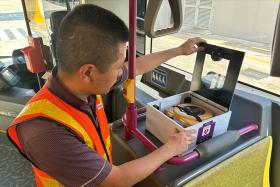Harsher penalties for errant PMD users flouting active mobility law
Fine, minimum age, mandatory online test among new measures
Footpath accidents involving personal mobility devices (PMDs) have fallen by 52 per cent since they were banned from footpaths last November.
Sentiments towards public path safety have also improved, Senior Minister of State for Transport Janil Puthucheary told Parliament.
To continue ensuring the safe use of active mobility devices such as PMDs and power-assisted bicycles, users will soon see the introduction of some new measures under changes to the Active Mobility (Amendment) Bill debated in Parliament yesterday. These include a mandatory online theory test for users.
Starting in April, the ban on mobility devices on footpaths will be extended to other devices, including hoverboards and electric skateboards.
Dr Puthucheary said that while most PMD users are largely law-abiding and ride responsibly, enforcement officers detected about 4,900 offences last year.
"This is not acceptable. To send a stronger deterrent message to this group, we will increase the maximum penalties for certain offences. We will generally double the penalties of key user behaviour offences."
Under the proposed changes, those who are caught riding PMDs on public paths without a certificate can now face a fine of up to $2,000 and six months in jail, or both, if they are first-time offenders.
If caught on roads, they can face a fine of up to $10,000, jail for three years, or both.
The Land Transport Authority (LTA) will also introduce a minimum riding age of 16 to ride a motorised PMD on a public path, starting with e-scooter riders. Those under 16 who wish to ride will require adult supervision.
Additionally, under the new law, holding a mobile communication device and operating any of the communication device's functions while riding - whether on public paths or roads - will be an offence.
The LTA will also put in place additional measures to ensure that users use only compliant active mobility devices on public paths.
To ensure compliance, LTA will be rostering e-scooters that are already registered and declared as UL2272-certified for inspections. It will also periodically call up certified and registered e-scooters for re-inspections every two years.
Said Dr Puthucheary: "We are ramping up our cycling path infrastructure building plans, so that Singaporeans can continue to benefit from active mobility devices. We will announce more about these plans during the Committee of Supply debate."
Mr Denis Koh, chairman of PMD enthusiast group Big Wheel Scooters Singapore, said that while many riders feel the sheer number of rules and changes are confusing, they recognise that with the backlash PMDs faced last year, something had to be done.
He stressed: "These regulations have to work in tandem with better infrastructure and education."
Firms must ensure riders have third-party liability insurance
Businesses using active mobility devices on paths, including food delivery services, will soon be required to ensure that their riders are covered by third-party liability insurance.
Senior Minister of State for Transport Janil Puthucheary said such organisations have a responsibility towards riders and members of the public in the course of business.
This law will first be applied to device-sharing operators who are licensed under the Shared Mobility Enterprises Bill, and businesses who employ or contract with riders who ride active mobility devices on public paths for work, such as food delivery companies, Dr Puthucheary added.
He said: "We are working with the Active Mobility Advisory Panel and the insurance industry to study how best to extend such insurance requirements to individual active mobility device riders."
The requirement is among a set of new measures Parliament agreed upon yesterday, after members passed two Bills to expand regulations for users, retailers and shared mobility enterprises that make use of active mobility devices.
For retailers, tougher laws and penalties will also be rolled out, to ensure compliance of the devices sold.
Dr Puthucheary said that last year, there were 28 instances where retailers were caught for various offences, including displaying and advertising non-compliant active mobility devices.
To prevent such behaviour, retailers will soon have to send e-scooters for inspection to certify that they comply with the prescribed device criteria before they are allowed to register, display, advertise or sell the e-scooters.
The ministry will also strengthen the Land Transport Authority's ability to take enforcement action against illegal modifications, to cover all modification activities on active mobility devices that are allowed for use on public paths, whether or not undertaken in the course of business.
They will also significantly increase penalties for retailer offences to send out a strong message of deterrence.
Dr Puthucheary said: "The penalty for selling a non-compliant device for use on public paths will be increased by more than four times."
The penalty will be changed from a maximum of $5,000 and three months' imprisonment, or both, to $20,000 and 24 months' imprisonment, or both, for a first-time offender who is an individual.
Retailers and corporate entities that cannot be subject to imprisonment will face up to $40,000 for the first offence.
Get The New Paper on your phone with the free TNP app. Download from the Apple App Store or Google Play Store now




